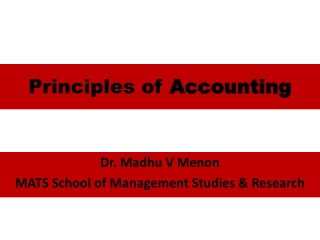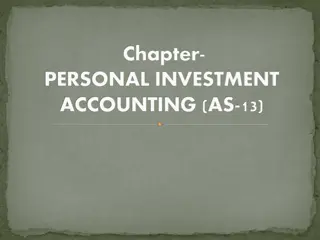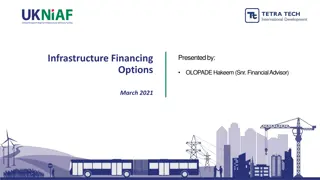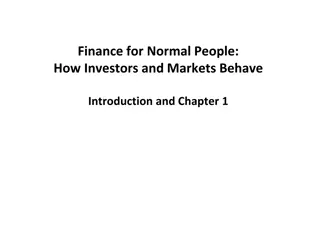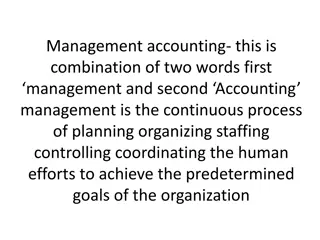Mental Accounting in Personal Finance
People often use mental accounts to categorize their financial decisions, leading to different outcomes based on how money is labeled and managed. This concept highlights how individuals allocate funds, make trade-offs, and prioritize goals within separate accounts. Through examples and research insights, the impact of mental accounting on spending, saving, and investing behaviors is explored.
Download Presentation

Please find below an Image/Link to download the presentation.
The content on the website is provided AS IS for your information and personal use only. It may not be sold, licensed, or shared on other websites without obtaining consent from the author.If you encounter any issues during the download, it is possible that the publisher has removed the file from their server.
You are allowed to download the files provided on this website for personal or commercial use, subject to the condition that they are used lawfully. All files are the property of their respective owners.
The content on the website is provided AS IS for your information and personal use only. It may not be sold, licensed, or shared on other websites without obtaining consent from the author.
E N D
Presentation Transcript
Chapter 6 Mental Accounting
People Use Mental Accounts Each decision or action is placed in a separate account The outcome is also placed into the account Costs and benefits are examined within the account The interaction between mental accounts is usually ignored Once in the mental account, it is difficult to view the situation in a different way 2
Consider the Ramifications: Mr. and Mrs. J Mr. and Mrs. J have saved $15,000 toward their dream vacation home. They hope to buy the home in five years. The money earns 10% in a money market account. They just bought a new car for $11,000 which they financed with a three-year car loan at 15%. 3
Mr. and Mrs. J, continued If you told Mr. and Mrs. J that they there was a safe investment that would earn them 15%, they would love it. By borrowing at 15% and earning 10% they are losing money! They could have borrowed from themselves! Labeling money The savings account is in a mental account labeled as Vacation Home. The car gets its own mental account. 4
Labeling forms of payment? Cash, credit/debit card, gift card You can buy something fun or practical with any of these What do you buy with a gift of cash or gift card? An experiment tested: Participants bought enjoyable items with the gift card more often than they did with cash payments People tend to assign gift card money to a pleasurable mental account and thus buy something fun with it 5 Chelsea Helion and Thomas Gilovich, Gift Cards and Mental Accounting: Green-lighting Hedonic Spending, Journal of Behavioral Decision Making 27 (2014): 386 393.
Mental Budgeting Relates the mental pain of costs with the mental joy of consuming a product People like a pay-as-you-go system because it is easy to match the costs and benefits However, some items are usually paid in advance or paid after (using debt) the purchase 6
Example Imagine that, six months from now, you are planning to purchase a clothes washer and dryer for your new residence. The two machines together will cost $1,200. You have two options for financing the washer/dryer: A. Six monthly payments of $200 each during the six months before the washer and dryer arrive. B. Six monthly payments of $200 each during the six months beginning after the washer and dryer arrive. 7
Example II Imagine that you are planning a one-week vacation to the Caribbean, six months from now. The vacation will cost $1,200. You have two options for financing the vacation: A.Six monthly payments of $200 each during the six months before the vacation. B.Six monthly payments of $200 each during the six months beginning after you return. 8
91 People Asked Washer/Dryer 84% chose payment schedule B. Washers and Dryers are used over time, payment schedule B best matches the benefits with the costs Vacation 60% chose payment schedule A. The joy of vacations are used up quickly. People don t want to be paying for a benefit that is already used up. The joy of the vacation is also greater without the thought of having to pay for over the next months 9
Ramifications on Using Debt People like to use debt when the benefit of the purchased is used over time. Cars, homes, T.V.s, etc. Matches benefits and costs People don t like debt when the benefit of the purchased is used quickly. Vacations People do not like to get pre-paid for work they would have to do over time Debit cards 10
Mental Money Laundering People separate income sources. Earned income from a job is considered different than investment income. What if you earn unethical income through illegal or illicit behavior? People clean the money through mental money laundering Give much of the money to charity Gamble with the money, which moves earnings to unearned account instead of unethical account Mix money from various mental accounts to blur the source 11
Sunk Costs Economics teaches that people should not consider sunk costs in making a decision to pursue an activity. Sunk costs are lost no matter the decision. Real people do consider sunk costs because they are part of the mental account under consideration. How much you paid for tickets to a game becomes a factor in your decision on whether to go or not 12
Sunk Cost Example Sunk costs have two important dimensions: size and timing Size example A family has tickets to a basketball game, which they have been anticipating for some time. The tickets are worth $40. On the day of the game, a big snowstorm hits their area. Although they can still go to the game, the snowstorm will cause a hassle that will reduce the pleasure of watching the game. Is the family more likely to go to the game if they purchased the tickets for $40 or if the tickets were given to them for free? People think the family is more likely to go to the game if they paid for the ticket, even though it is a sunk cost. They opened a mental account when they bought the tickets. 13
Sunk Cost Example Time example A family has long anticipated going to the basketball game, which will take place next week. On the day of the game, a snowstorm occurs. Is the family more likely to go to the game if they purchased the $40 tickets one year ago or yesterday? People think the family is more likely to go to the game if they paid for the ticket yesterday 14
Economic Impact Time value of money principles suggest that paying later is the wealth-maximizing choice. Yet, people are often willing to pay more in order to better match the costs and benefits of a purchase 15
Example Select a loan to finance the $7,000 cost of a home- remodeling project. The project involves redecorating (new carpet, wallpaper, paint, etc.) and would last four years, when you would have to redecorate again. Two borrowing options are available: A. A 3-year term and an interest rate of 12%. B. A 15-year loan with an 11% interest rate. Both loans can be prepaid without penalty. 16
56 MBA Students Asked 74% preferred the 3-year loan 3-year loan is more expensive The 3-year loan better matches the life of the remodeling project 15-year loan could have been used and paid off early! 17
Mental Accounting and Reference Points New York taxicab drivers: They narrowly frame each day s income separately (mental accounting) and compare to a reference point Because they are loss averse compared to the reference: On bad days, they work longer hours to avoid a loss On good days, they reach the reference early and work fewer hours They could work fewer total hours and make more money if they worked longer hours on good days and fewer on bad days! Colin Camerer, Linda Babcock, George Loewenstein, and Richard Thaler, Labor supply of New York City cabdrivers: One day at a time, Quarterly Journal of Economics 112(1997): 407-441. 18
Can Money Make You Happy? Of course it can But how happy depends on how you spend it We put each experiential or material purchase in a mental account We tend to adapt to the presence of our material things quickly Revisiting the experiential mental accounts allows us to relive the experience and revive the happiness of the moment Prospect theory Making a $1,000 profit makes you happy. Making a $2,000 profit makes you happier, but not twice as happy So, instead of buying expensive 50-yard line football tickets, buy cheaper tickets to 2 games Each game is a separate account 19
Spending money on others will make you happy People are deeply and profoundly social Spending locally is more gratifying then spending nationally It is more pleasurable to contribute to the American Cancer Society through the local Relay for Life event compared to a payroll deduction paid directly to the national organization Four ways to spend your way to happiness: (1) Buy experiences, not things (2) Buy many small things instead of few big ones (3) Pay now to consume later (4) Help others 20
Mental Accounting and Investing Magnifies Disposition Effect Investors don t see the tax advantage in selling losers because it requires the interaction between mental accounts Alters Perception of Risks Miss the co-variation between investments Behavioral portfolio discussed in Chapter 8 21
Retirement Plan Allocation to Equities 68.8% of these people have very poor asset allocation! 22 Julie Agnew, Pierluigi Balduzzi, and Annikva Sund n, Portfolio Choice and Trading in a Large 401(k) Plan, American Economic Review 93(2003): 193 215.
Mental Accounting and Asset Allocation Six months before and after a firm changes its policy so that employees choose matching contribution asset allocation in 401(k) plan. Allocation to employer stock Allocations after being allowed to determine firm s contribution shows that employees want about one allocated to employer stock. So why did they contribute one third of their own contribution when firm allocated 100%? 23 James Choi, David Laibson, and Brigitte Madrian, 2009, Mental Accounting in Portfolio Choice: Evidence from a Flypaper Effect American Economics Review, 99(5): 2085-95.
Summary The process of mental accounting leads people to think about each of their investments in isolation People do not think about any benefits or costs associated with the interaction between investments, like diversification and tax swaps Spending can make you happy if done correctly Narrow framing leads to poor asset allocation and too much allocation into an employer s stock Mental accounting exacerbates the disposition effect 24


